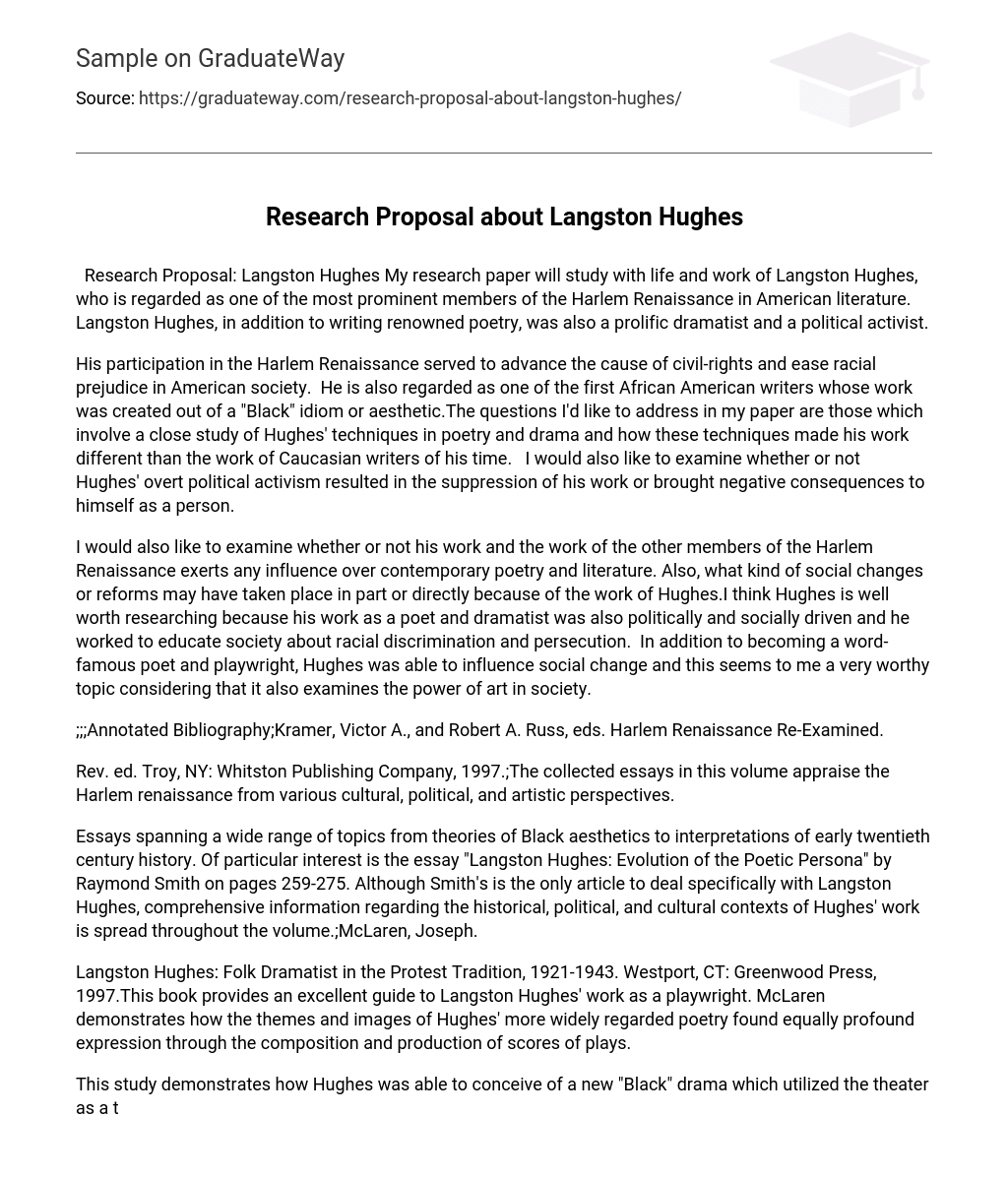Research Proposal: Langston Hughes My research paper will study with life and work of Langston Hughes, who is regarded as one of the most prominent members of the Harlem Renaissance in American literature. Langston Hughes, in addition to writing renowned poetry, was also a prolific dramatist and a political activist.
His participation in the Harlem Renaissance served to advance the cause of civil-rights and ease racial prejudice in American society. He is also regarded as one of the first African American writers whose work was created out of a “Black” idiom or aesthetic.The questions I’d like to address in my paper are those which involve a close study of Hughes’ techniques in poetry and drama and how these techniques made his work different than the work of Caucasian writers of his time. I would also like to examine whether or not Hughes’ overt political activism resulted in the suppression of his work or brought negative consequences to himself as a person.
I would also like to examine whether or not his work and the work of the other members of the Harlem Renaissance exerts any influence over contemporary poetry and literature. Also, what kind of social changes or reforms may have taken place in part or directly because of the work of Hughes.I think Hughes is well worth researching because his work as a poet and dramatist was also politically and socially driven and he worked to educate society about racial discrimination and persecution. In addition to becoming a word-famous poet and playwright, Hughes was able to influence social change and this seems to me a very worthy topic considering that it also examines the power of art in society.
;;;Annotated Bibliography;Kramer, Victor A., and Robert A. Russ, eds. Harlem Renaissance Re-Examined.
Rev. ed. Troy, NY: Whitston Publishing Company, 1997.;The collected essays in this volume appraise the Harlem renaissance from various cultural, political, and artistic perspectives.
Essays spanning a wide range of topics from theories of Black aesthetics to interpretations of early twentieth century history. Of particular interest is the essay “Langston Hughes: Evolution of the Poetic Persona” by Raymond Smith on pages 259-275. Although Smith’s is the only article to deal specifically with Langston Hughes, comprehensive information regarding the historical, political, and cultural contexts of Hughes’ work is spread throughout the volume.;McLaren, Joseph.
Langston Hughes: Folk Dramatist in the Protest Tradition, 1921-1943. Westport, CT: Greenwood Press, 1997.This book provides an excellent guide to Langston Hughes’ work as a playwright. McLaren demonstrates how the themes and images of Hughes’ more widely regarded poetry found equally profound expression through the composition and production of scores of plays.
This study demonstrates how Hughes was able to conceive of a new “Black” drama which utilized the theater as a tool for social and political protest and education. McLaren’s study traces Hughes development as a playwright from folk-play roots to ambitious avant garde productions. An important source to demonstrate Hughes’ diverse literary talents and social activism.;Rampersad, Arnold.
The Life of Langston Hughes. Vol. 2. New York: Oxford University Press, 2002.
This volume is a biographical source which traces Langston Hughes’ life in his mature and productive years. Rampersad’s investigation into Hughes’ life is of a primarily political nature, with special emphasis on how Hughes’ personal experiences shaped his radical political thought and artistic expression. This study includes an appraisal not only of Hughes handling of political challenges but of his fame and notoriety as a writer.;Tracy, Steven C.
, ed. A Historical Guide to Langston Hughes. New York: Oxford University Press, 2004.This study places Hughes’ work in context with the prevailing literary traditions of his time.
By placing Hughes’ work in the tradition of the American literary canon and drawing out influences such as Whitman and other historically famous American authors, Tracy’s book allows for an investigation as to Hughes’ place in American letters primarily as a literary theorist and writer. This book serves to balance the more politically driven studies of Hughes’ work noted elsewhere in the bibliography.





